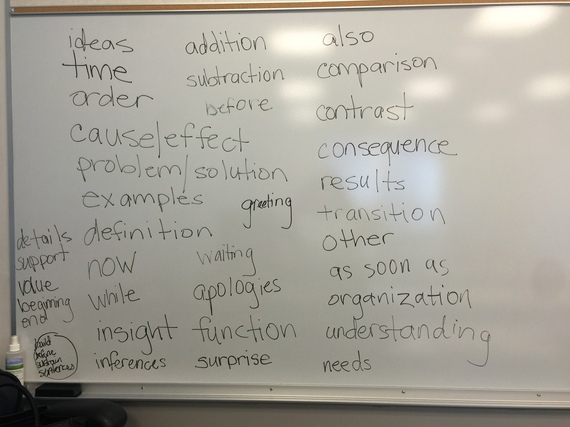Two people meet. They smile. They talk. They smile some more. The minutes turn into hours and the hours turn into days, and everything is blissful and giddy and full of giggles and blushes and hugs, until reality sets in.
For those of us who are divorced, the reality is usually one of gloom and doom. Something goes wrong and we become bitter. We see a sign to slow down and instead, we dismiss the future of any possibility of love to come. And my personal favorite, we now have to navigate social media in post-divorce world when we didn't even have social media in the glory days of our younger years.
Earlier this semester I was proud to deliver a lecture about grammatical relationships to a college reading class. As I presented the material, I wrote key words on the board that would illustrate points about reading comprehension. Before I knew it, a student raised his hand and said, "Are you talking about reading skills or relationship skills? In another class we talked about how the exact same thing is needed in order to have a successful relationship with someone."
Of course I'm talking about reading, I thought. As he explained himself, it became much clearer. It was so clear that I noticed the other students' body language even changed. The mood in the room moved from one of intellectual curiosity to a lot of nervous laughter that was masking issues with romantic vulnerability that have led to heartbreak. It was also clear that without me even knowing it, the elephant in the room had now been introduced to the crowd.
We were going to talk about relationships. And not the kind between nouns and verbs. We were going to talk about heartbreak. So we did. Soon, I started feeling uneasy. I was the one with nervous laughter and jumbled-up memories.
Romantic relationships have an uncanny way of using the same patterns and concepts that are taught in English classrooms. There is a connection between being successful in reading and being successful in love. Even if it means starting over.
1.Just like a literary work, a relationship has a beginning, a middle, and an end. For those who are divorced, the end (or the fear of the end) can be a focal point. Remember that the beginning and the middle are great experiences if we allow them to be. Understanding where you are in the story can help you understand the story better.
2.Take it slow. When reading something for the first time, read it slowly at first. Then allow a rhythm to develop between the words, the thoughts, and the brain. Relationships also need time to develop, grow, and establish a rhythm between the heart and the brain. In my post-divorce dating life, it's when I haven't allowed that natural rhythm to develop that I've had the biggest headaches and heartaches.
3.Characters work to solve problems, and so do humans. In prose, the characters are often faced with problems they must solve. Interpersonal relationships work the same way. For the divorced, we have to be willing to actually solve the problems, not ignore them or walk away.
4.Talk it through. Sometimes, talking about things helps. Even if you are talking to yourself. Talking helps process an understanding of both specific and general instances that may not be processed just from thinking.
5. Pay attention to the roles. The parts of speech have distinctive roles or functions in a sentence. In relationships, people can take on roles as well. In the English language, there are even words that have more than one role, depending on how the words are used. Don't use something as a noun that was meant to be a verb or adjective. In relationships, one of the words that is commonly attributed the wrong meaning is the word love.
6. Definitions always help. When reading something we don't understand, sometimes a definition of certain words can help. In a relationship, especially a new relationship in a post-divorce world, certain titles and expectations need to be defined so the comprehension of the story (or relationship) is better. I know there's that weird time in the beginning when it may be a bit uncomfortable to talk terms and meanings, but if it's worth reading (or dating), it's worth understanding.
7. Transitions are necessary. Even when we aren't ready to move on in a story, we must. The key to successful writing is the ability to move from one episode or adventure to the next seamlessly. The language should flow for the readers so we know something is about to change. In relationships, change is inevitable. It's not necessarily bad change, but it's still change. That fabulous night has to end and transition to a whole new day. A celebration will be over and life will eventually return to normal. We may get angry with the author or with the universe for this, but it's up to us to follow the transition, because the next step is right around the corner.
As in life and literature, the transitions are essential for future connections within the same story, or when beginning a new one. After all, everyone loves a good sequel, right?

